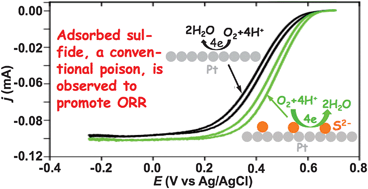Unconventional promoters of catalytic activity in electrocatalysis†
Abstract
Promoters and poisons for catalytic activity have been a subject of intensive research in both heterogeneous catalysis and electrocatalysis for decades, driven primarily by profound financial and societal implications involved because catalyzed reactions are at the center of many enterprises of chemical and petroleum industries. Consequently, there exist well-identified promoters and poisons, such as electropositive alkali elements for the former and electronegative later 2p elements for the latter, respectively. Research on catalytic promoters or poisons has traditionally been along the lines of these conventional classifications of promoters vs. poisons. However, this short Critical Review will not follow such traditional lines of reasoning, i.e., to discuss how the well-identified promoters can be better utilized and/or how the equally well-identified poisons can be eliminated or better tolerated. Rather, it will focus on cases that highlight an emerging area of research in which many traditional poisoning species have been used to promote catalytic activity, which include recent work on using sulfur and poly(vinylpyrrolidone) (PVP) as catalytic promoters carried out in the author’s lab.

- This article is part of the themed collection: Bimetallic nanocatalysts and nanocatalysis

 Please wait while we load your content...
Please wait while we load your content...